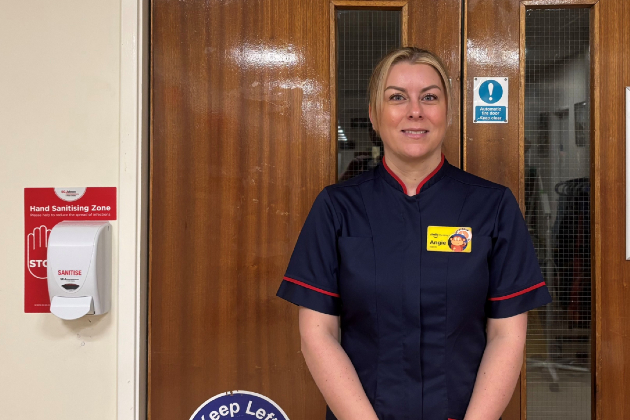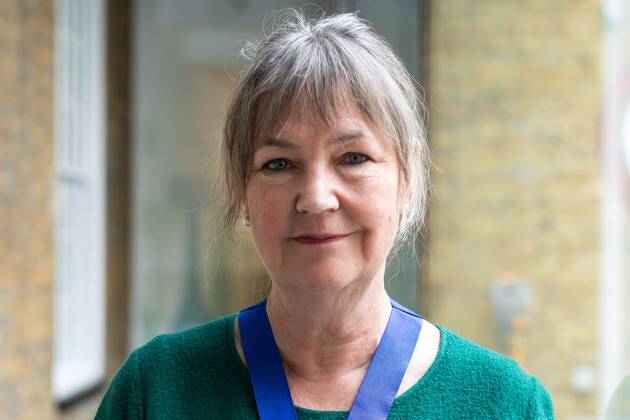I qualified three years ago as a mental health nurse. During the pandemic, I was pregnant but my employer said I should carry on working. Unfortunately, I ended up contracting COVID-19 20 weeks into my pregnancy. I was very ill and hospitalised at one stage. It took me around four or five weeks to recover. My breathing was badly affected and I had some panic attacks, so I couldn’t continue working
I ended up giving birth early, I think because of all the stress I was under. Then, when my baby was just three months old, my mum was killed by a taxi driver in a hit and run accident in Africa. It was shocking. I’m the first born, so I had to go home for three weeks to organise and pay for her funeral.
When I got an eviction notice, I turned to the RCN for help
When I got an eviction notice from my landlord, I turned to the RCN for some help, as by then I was several months in arrears. Sometimes I didn’t have money for food. And all the time I was trying to take care of my baby.
The RCN Foundation gave me a grant of £300 to help and the RCN Welfare Service has also supported me through a possession hearing, when thankfully the court agreed that I shouldn’t be evicted. But I have a suspended order and must pay extra money towards the debt. If I miss one payment, they can then evict me without going back to court.
Balancing work and being a single parent
Now my baby is 10 months old and I’m planning to return to work, but I’ve realised that this can’t be full-time. I’m a single parent and childcare is going to cost me £100 a day. How can I afford it? Even though they pay more, I can’t work nightshifts because childcare would be so expensive.
I had been relying on my mum, who was going to come to the UK to help me with the baby, but of course that can’t happen now and I’m left with no nearby family support.
How will I manage in the future? How will other nurses?
I’ve asked to work part-time, with fixed hours, and my manager is trying to resolve this. I’m better off with this arrangement, as I’ll still have some entitlement to universal credit, which will be the only way to afford childcare. At the moment, I think I’ll be lucky to be left with £50 a month - and that’s before energy prices and food goes up even further.
If I’m finding it difficult at this point, how will I manage in the future? And how will other nurses? I don’t want it to be like this and I feel disappointed. I try to be positive, but the reality is it’s hard and I’m worried. I went into nursing so I would feel comfortable. But unless you do a lot of agency work – which of course can be insecure and unpredictable – it’s really difficult. And I want time to be with my children.
Fair pay would make a real difference
I have a baby who needs me and a teenage son. I’m trying to protect him as much as I can, but he knows I’m not in a good place financially. He doesn’t say when he needs something, like a new pair of shoes, because he doesn’t want to upset me.
If pay was a bit more, it would make a real difference
If pay was a bit more, it would make a real difference. I want to be able to go to work and know that the money I earn is enough for my family to lead a proper life and be content – but it’s not. Yet we work so hard. It demoralises you and it affects a lot of things in your life. I know that mental stress can also make you physically unwell too and I’m trying my best to avoid this happening, but it’s hard because of the worry.
Main image: Getty stock image
Our fight for fair pay
The RCN is campaigning for an NHS pay rise of 5% above inflation, to help address the cost-of-living crisis and encourage people to stay in the nursing profession.
You can help our fight for fair pay by having impactful conversations with colleagues, and telling your friends, family and the public how vital pay is to ensure services are safely staffed.
Sign up to become a campaign supporter and order campaign materials to display in your workplace.
Find out more and get involved with our campaign for fair nursing pay.
Where can I get help?
Whether you’re finding it increasingly hard to make ends meet or feeling overwhelmed by spiralling debts, the RCN provides a broad range of financial advice and support, so you can begin to gain control again.
The first step is to take a look at our financial wellbeing pages, says RCN Welfare Adviser Ian King. “Use our online guidance to see what strategies might help you improve your own situation, directing you towards what to do next,” says Ian. “There is lots of help out there, so don’t think you’re on your own.”
Our resources include a budget planning tool and a financial wellbeing checker, which signposts you towards further support, depending on your individual circumstances. The webpages also provide help with claiming various benefits and dealing with specific money worries, such as rent arrears or overpayment of wages, benefits or tax credits.
“Often a sudden and unexpected drop in income can be a trigger for needing help,” says Ian. For example, injury or illness, a partner leaving, or fleeing domestic abuse. “In these different circumstances, someone may not know what kinds of benefits they’re eligible to claim or the various sources of support that could be available,” he says. Alongside welfare benefits, in a limited number of situations these can include charitable grants, referrals to discretionary funds or voucher schemes for food and energy.
While the RCN can’t currently offer advice about regulated debts such as credit cards and loans, we do have guidance on how to take control of debts, including what to do if you don’t have enough money to pay your creditors after paying your essential living costs. There is also support for those facing a “debt emergency”, such as court or bailiff action, eviction or disconnection.
The RCN’s Welfare Service offers one-to-one telephone appointments, which can be made via our advice team on 0345 772 6100.
“But before you contact us, we strongly advise you to look at the online advice and complete all the tools and checkers relevant to your circumstances,” says Ian. “You may find they answer your query without the need for an appointment.”








